From Struggle to Strength
Margret Ndisya’s Journey to Resilient and Profitable Farming in Makueni
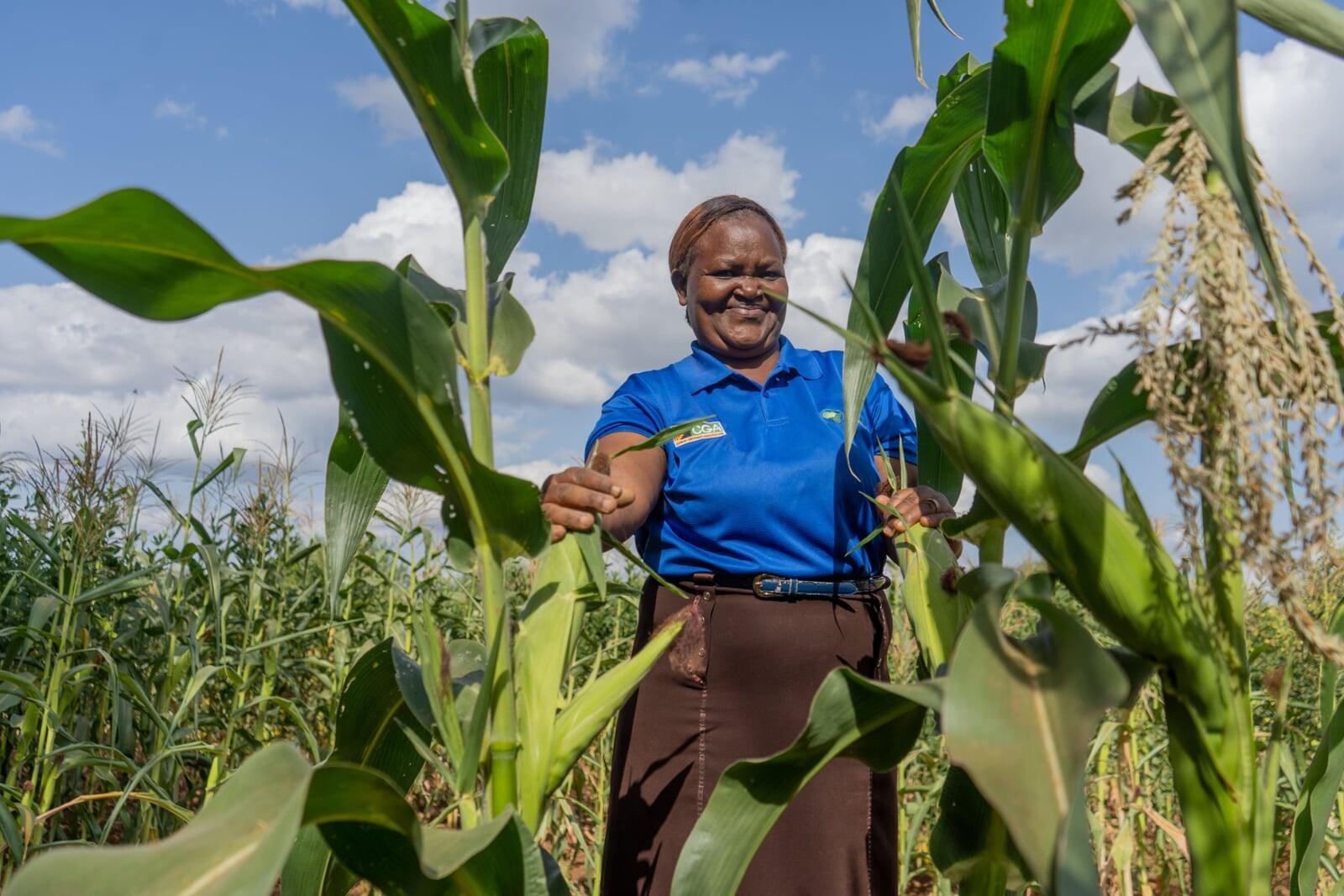
In Emali Mulala Ward, Kibwezi West, Makueni County, Margret Ndisya is reshaping what success looks like for smallholder farmers. Once limited by unpredictable rains and low yields, her farm now thrives powered by resilience and sustainability.
Before 2020, farming was a constant struggle. Rainfall was erratic, crops underperformed, and livestock feed was scarce. “We worked hard, but there was little to show for it,” she recalls. Like many in her region, Margret faced low productivity, poor income, and food insecurity made worse by climate shocks.
Things changed when she joined the STRAK project, implemented by the Cereal Growers Association (CGA) with support from AGRA. With guidance from her Village-Based Advisor (VBA), Beatrice Matolo, she adopted Regenerative Agriculture (RA) and Climate Smart Agriculture (CSA) practices. These included Zai Pits for moisture retention, silage bags for feed storage, enterprise diversification, and agroforestry.
Now, Margret grows enough food and earns income from selling surplus milk, eggs, and crops. “Farming has become a business,” she says. Improved chicken breeds, a thriving home garden, and better maize yields have boosted both food security and profits. Still, she faces challenges. “Zai Pits help, but we need tanks and dam liners to cope with longer dry seasons,” she explains. With continued support, farmers like Margret are proving that resilience leads to greater productivity and lasting profitability.
"Before the VBA came in, farming gave me stress. Now I harvest enough, sell the surplus, and farming has become a business."
Margret Ndisya, Farmer, Makueni County
Sowing Resilience
How Beatrice Matolo is Transforming Farming in Makueni
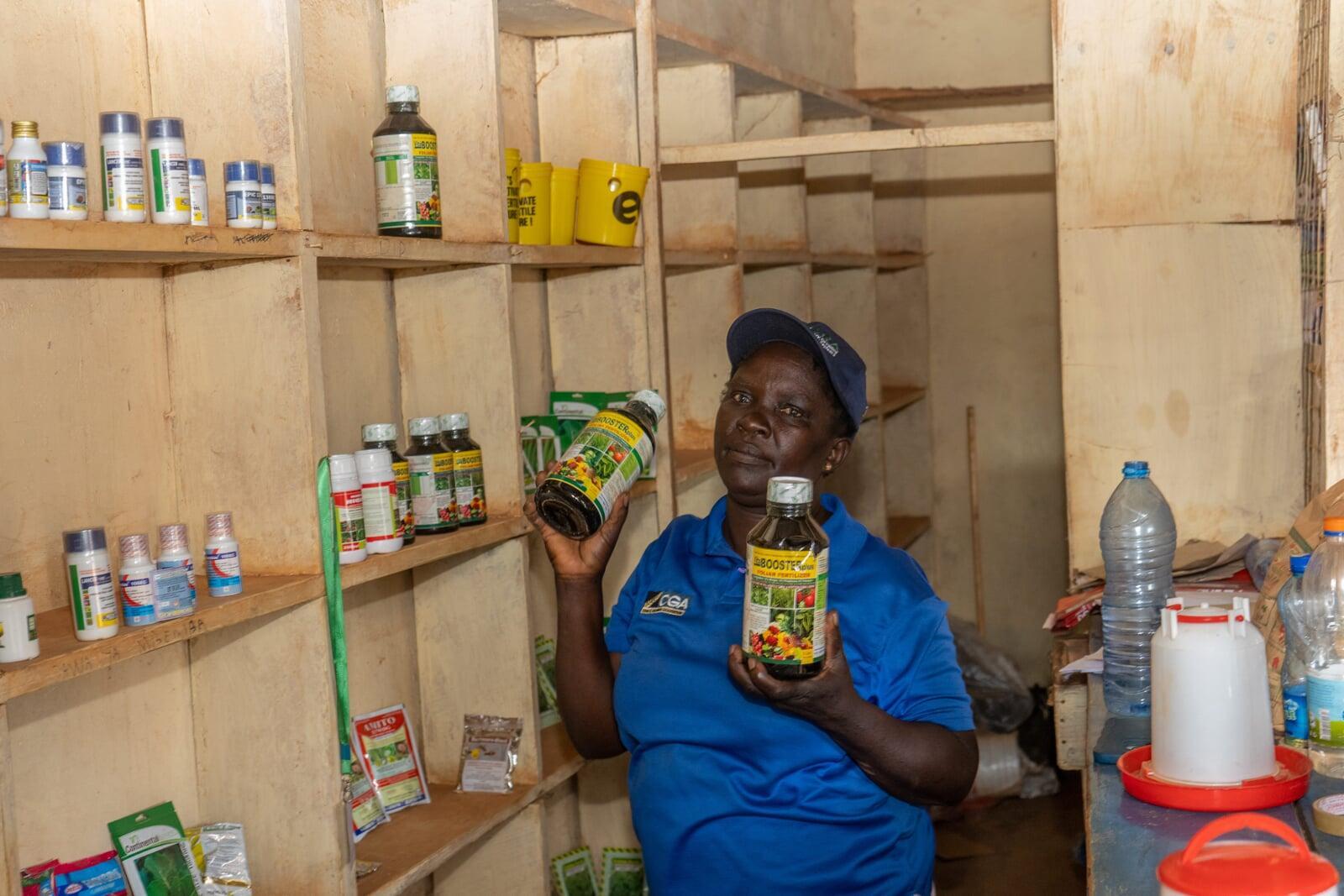
In the dry stretches of Emali Mulala Ward, Kibwezi West, Makueni County, Beatrice Matolo is planting more than seeds she’s sowing resilience, productivity, and hope. As a Village-Based Advisor (VBA), Beatrice supports over 200 farmers with training and market linkages that are turning subsistence into success.
Before 2020, many farmers in the area struggled with poor yields, erratic rainfall, and limited access to quality inputs. Farming was hard work with little return and little motivation to adopt new techniques.
But Beatrice’s journey with the STRAK project, implemented by the (CGA) with support from AGRA, changed the game. Through this initiative, she received hands-on training in Regenerative Agriculture (RA) and Climate Smart Agriculture (CSA) techniques that conserve soil, store water, and boost productivity.
Empowered by CGA’s mentorship, Beatrice opened an agrovet shop at Tutini Market, linking farmers to certified seeds, fertilizers, and essential inputs. She became an agent for Uzima Chicken and FIPs Africa, providing access to improved poultry breeds.
The impact is real. Yields are up. Income streams are diversified. Farmers are farming smarter, not harder. And in Beatrice’s words:
“Change takes time, but once a farmer sees results, they don’t go back.”
— Beatrice Matolo, VBA, Makueni County
With the STRAK project and CGA’s steady hand behind her, Beatrice is proof that when grassroots leaders are empowered, entire communities grow stronger resilient, productive, and profitable.
Engineering Resilience
Alburnus Mwangangi’s Innovation Journey in Post-Harvest Solutions

In Kiundwani Market along Mombasa Road, Alburnus Mwangangi, a youth Village-Based Advisor (VBA) and founder of Empire Innovation, is rewriting what youth-led agriculture can achieve. Through machine design and fabrication, he is addressing a critical gap in the agricultural value chain: post-harvest resilience.
Alburnus joined the STRAK project in 2022, introduced and supported by (CGA) AGRA’s implementing partner. With CGA’s mentorship, he was connected to the World Food Program, who provided a grant to establish Empire Innovation, his now-thriving enterprise that serves over 150 farmers in Makueni.
At his workshop, Alburnus designs and builds threshers, hay balers, chaff cutters, motorized weeders, charcoal coolers, incubators, drum pumps, and motorized ploughs tools customized to meet the needs of smallholder farmers adapting to climate stress and post-harvest losses.
“RA taught me to think like a farmer first understand their pain points, then build solutions that work. That mindset fuels everything we create at Empire Innovation,” he says.
Today, Alburnus earns KES 1,500 per threshing session, offers farmer training at KES 200 per day, and supplies machinery services that generate steady income while enhancing farmer productivity and profitability. He has also trained and employed 23 youth, contributing to community empowerment and job creation.
“The STRAK project helped me move from a concept to a company. With CGA’s support, I’m building tools that build farmers. That’s resilience that pays off.”
— Alburnus Mwangangi, CEO, Empire Innovation
By blending innovation with regenerative agriculture principles, Mwangangi’s journey proves that resilience leads to productivity and productivity leads to profit. With the right support systems, youth-led agribusinesses like his are paving the way for Kenya’s next generation of agricultural transformation.
Rooted in Resilience
Christine Journey to Profitable Climate-Smart Farming
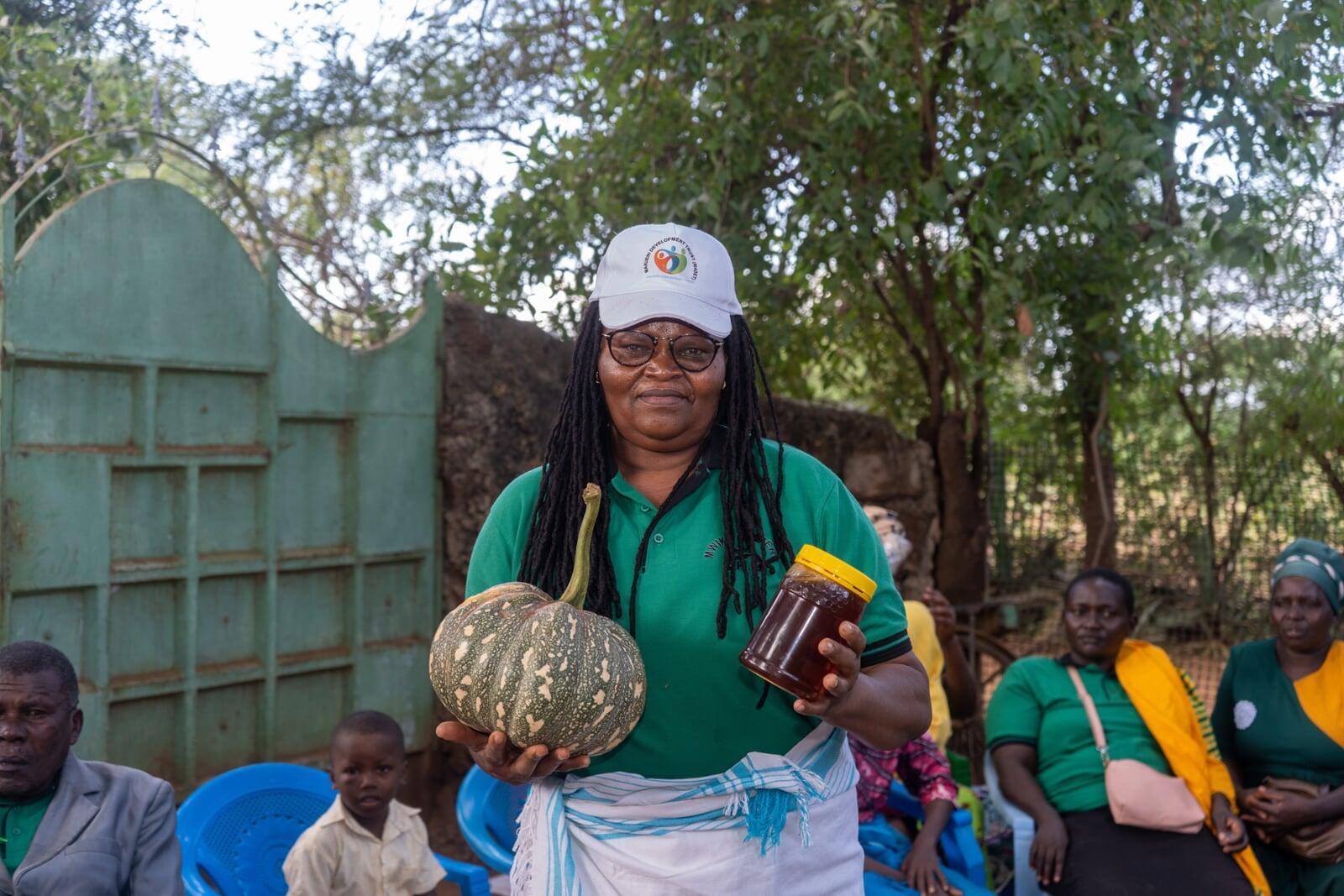
In the dry lands of Emali Mulala Ward, Makueni County, Christine Ndambuki is proving that resilience can be profitable. Since joining the STRAK project in 2022 through CGA, AGRA's implementing partner, Christine has transformed her farm and her community through Regenerative Agriculture (RA) and Climate Smart Agriculture (CSA) practices.
Before the project, her farm struggled under low rainfall and poor yields. But with the guidance of CGA and the knowledge gained through STRAK, Christine adopted zai pits, terraces, and a farm pod for water harvesting. She integrated Dorper sheep, poultry, and pasture trees like lucina into her system. She enriches her soil with manure and mulch and practices agroforestry to increase resilience.
Beyond her farm, Christine chairs the Mwika Farmers Self Help Group, made up of 23 members (17 women, 3 youth, 3 men). Together, they have built income through table banking, merry-go-round savings, and pasture technologies. They have also ventured into sorghum value chains, even producing sorghum-based tea.
“Before STRAK, the land was dry and unproductive,” Christine says. “Now we have food, we sell surplus, and agriculture is finally promising.” Thanks to CGA’s ongoing support, Christine continues to link farmers to technologies, climate-smart solutions, and learning opportunities. Her leadership demonstrates how resilience-based farming increases both productivity and profitability empowering rural women to lead transformation from the frontlines.
“CGA and AGRA introduced us to smarter farming. Now we’re more productive, more profitable, and more prepared for dry spells.” Christine Ndambuki, Chairperson, Mwika Farmers SHG
From Dry Fields to Thriving Yields
How Lina Nzambia Turned Resilience into a Business
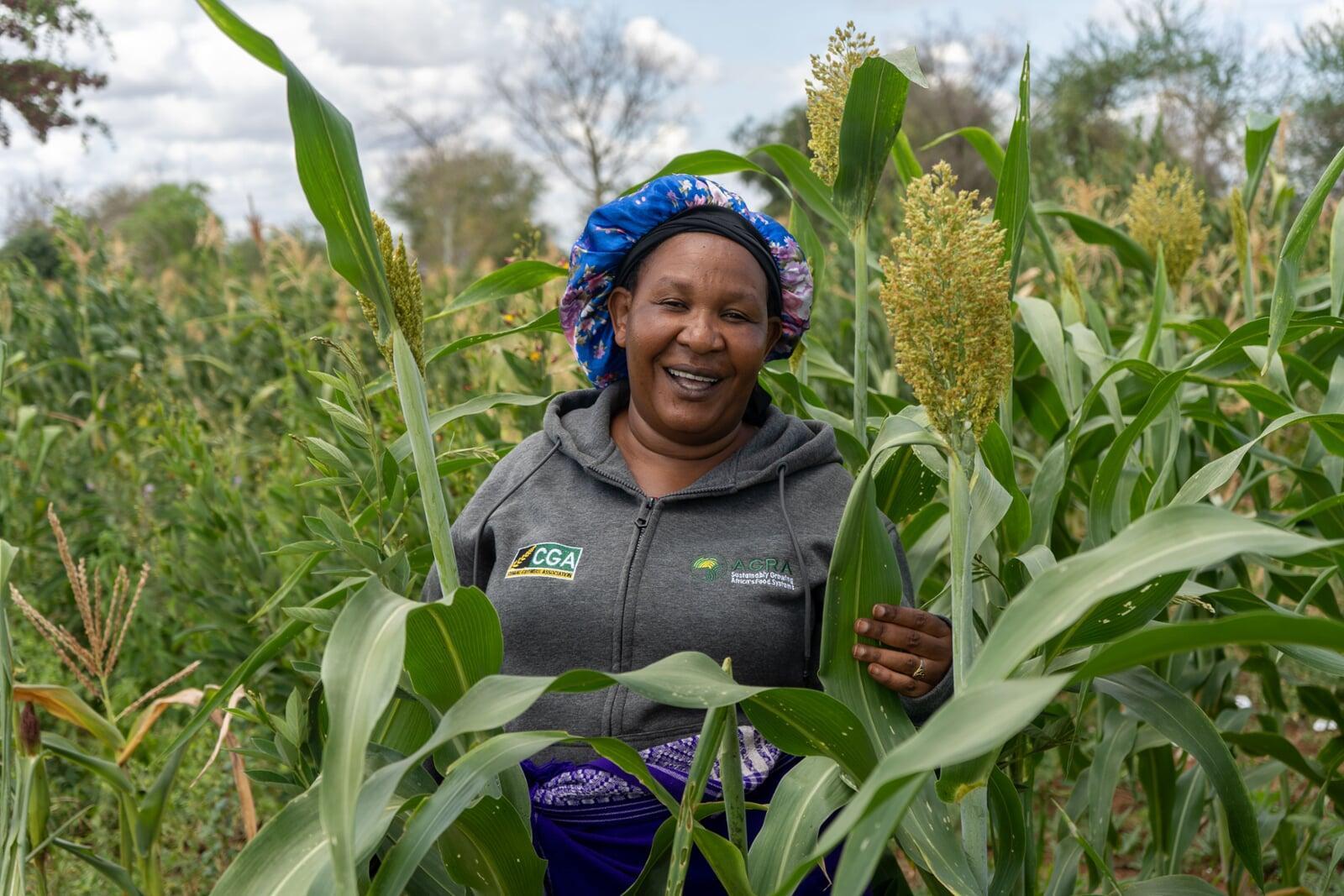
In the sunbaked fields of Kawuongo, Kwa Vonza Ward, Kitui Rural, Lina Nzambia is rewriting the rules of farming. Once at the mercy of climate shocks, today she’s a thriving farmer and agro-entrepreneur, showing that resilience isn’t just survival it’s a business model.
For years, Lina’s farm barely scraped by poor rains, frequent pests, and costly post-harvest losses kept profits out of reach. “We planted, but there was no certainty we would harvest,” she says. Farmers around her faced the same limited inputs, failing soils, and food insecurity.
Lina joined the STRAK project powered by AGRA and brought to life on the ground by CGA. She quickly took to regenerative agriculture (RA) techniques: laying terraces, establishing rip lines, planting trees, and integrating poultry for food and income. With better training and tools, she turned her knowledge into a venture launching an agroshop to supply inputs to fellow farmers.
Today, her farm is thriving and her agroshop buzzing with activity. “I’m not just feeding my family I’m running a business that supports my community,” she shares. Still, she dreams of solutions for pest management and affordable threshing services to help farmers scale further.
“Regenerative agriculture is not just good for the soil it’s good business. My farm is productive, my shop is profitable, and I’m proof that resilience pays.”
— Lina Nzambia, Farmer & Agro-entrepreneur, Kitui Rural
With CGA’s support through STRAK, Lina is a beacon of what’s possible. Her journey is living proof that adopting climate-smart, regenerative practices leads to resilience, which fuels both productivity and profitability.
From Chaos to Collective Power
How Kamantho Farmers’ Cooperative is Thriving through Regenerative Agriculture

Insert Photo Here: A group photo of Kamantho Cooperative members outside their aggregation centre
In the heart of Kawuongo, Kitui Rural, a quiet revolution is unfolding. Kamantho Farmers’ Cooperative, once a struggling cluster of scattered producers, is now a thriving aggregation hub and a model for how regenerative agriculture (RA) can transform farming from subsistence to success.
The cooperative, which now boasts 140 active members, was established under the KCEP-KRAl project and is currently led by Lina Nzambia, a progressive farmer and entrepreneur. Before RA training, many members farmed with no clear strategy. Water was scarce, yields were low, and market access was unpredictable. “We were farming for the sake of it,” Lina recalls.
Everything changed with the STRAK project, powered by AGRA and implemented by CGA. The cooperative was supported to adopt RA practices such as water harvesting, agroforestry, and better crop spacing. STRAK also facilitated market linkages connecting farmers to off-takers and helping them collectively buy inputs and sell produce at better prices.
Today, the cooperative safely stores produce while awaiting favorable markets, reducing post-harvest losses. Water harvesting has improved crop resilience, and the farmers now grow more food than before. “We are feeding our families and earning from the surplus. Regenerative agriculture has made farming predictable and profitable,” says one member.
"Before STRAK, we were scattered. Now, we are united, productive, and ready for any market. RA has changed how we farm and how we live." Member, Kamantho Farmers’ Cooperative
Kamantho’s success shows that when farmers unite around sustainable practices, resilience isn’t just possible it becomes a path to prosperity.
From Bees to Bounty
How Elizabeth Malusi is Cultivating Resilience in Kitui West
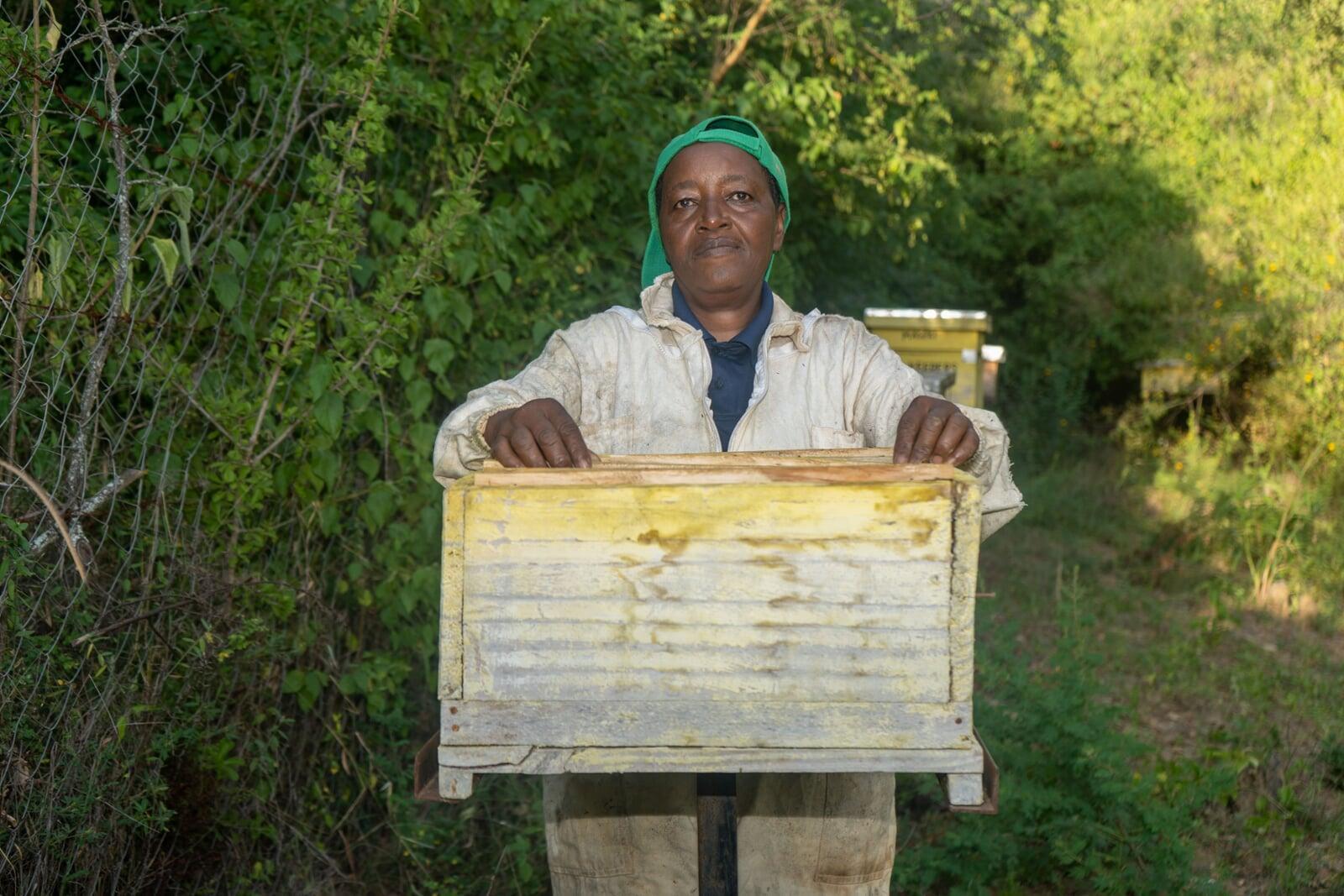
In the arid stretches of Maseki Village, Matinyani Ward, Kitui West, Elizabeth Malusi is doing more than farming she’s engineering resilience. As a Village-Based Advisor (VBA) serving over 150 farmers, Elizabeth has transformed her plot into a living classroom of regenerative agriculture (RA) and a beacon of hope for her community.
Before October 2022, the land told a different story: low yields, water stress, and unpredictable returns. But with the support of the CGA team through the AGRA-STRAK project, Elizabeth embraced a suite of RA practices that have since reshaped her livelihood and her leadership.
She now manages a thriving agroforestry and tree nursery, keeps bees buzzing in active apiaries, and raises poultry alongside nutritious home gardens. She’s built soil and water conservation structures, planted fruit trees, and engaged in value addition to boost her farm’s profitability.
Her honey, eggs, and tree seedlings don’t just feed her family they bring in income and opportunities. Her tree nursery supplies farmers with climate-smart seedlings, while her apiculture and poultry ventures offer quick-turnaround revenue. And as a trainer and mentor, she’s empowering other farmers especially women to adopt RA and unlock productivity.
With CGA’s continued guidance, Elizabeth is clear-eyed about the future: resilience is not just surviving climate shocks it’s farming smart, earning consistently, and leading boldly.
Leading Regenerative Farming and Market Access in Tharaka Nithi
Janice Kabeti
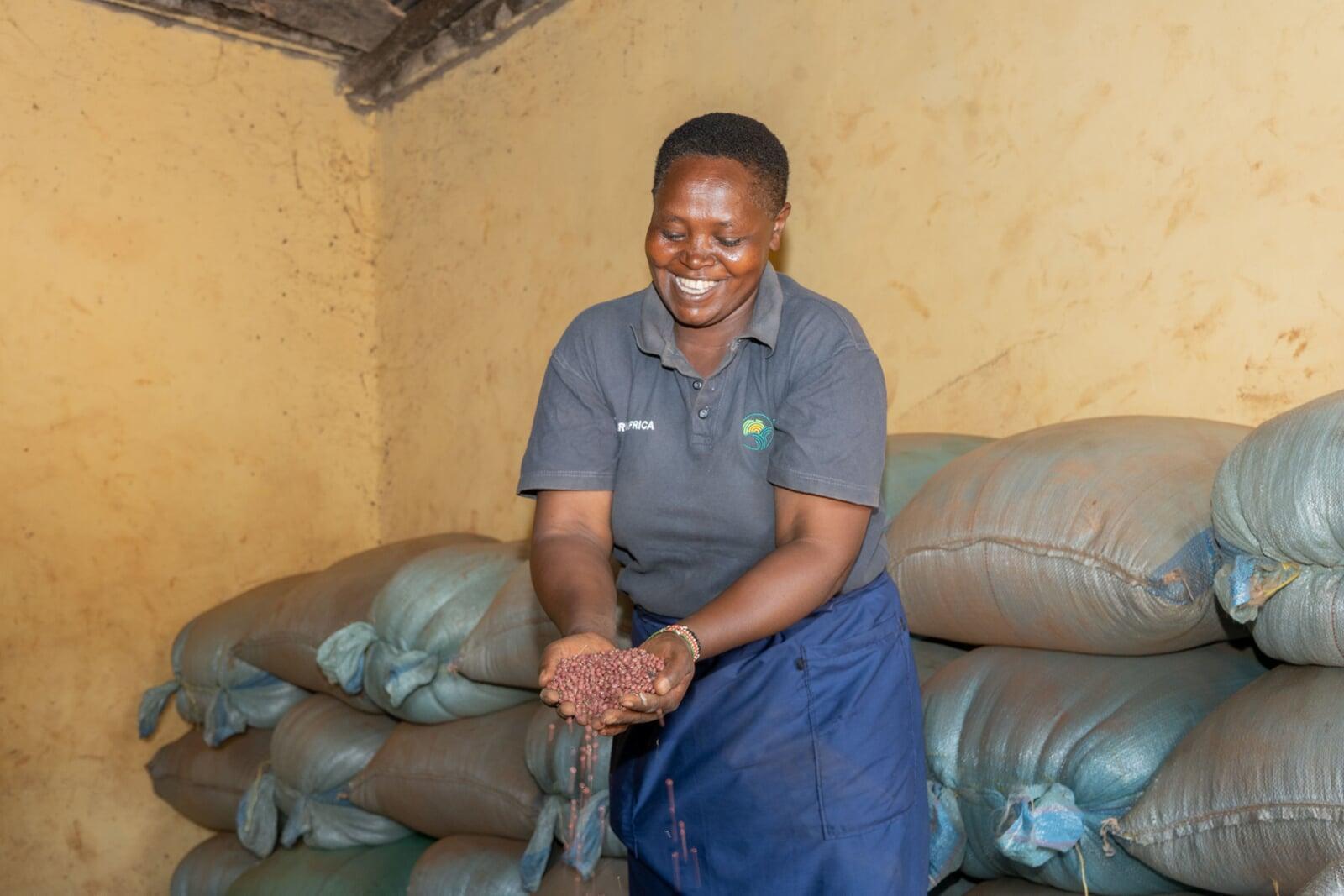
In Mukothima Ward, Tharaka Nithi County, Janice Kabeti is transforming farming from a struggle into a structured, market-ready venture. As a Village-Based Advisor (VBA) and chairlady of Gatithini Farmers’ Cooperative Society, Janice supports over 800 farmers with practical solutions grounded in regenerative agriculture (RA).
Before the STRAK project supported by AGRA and implemented by Farm Africa aggregation in the area was disjointed, and market access unreliable. But after joining STRAK, Janice and her cooperative established systems for land preparation, input access, aggregation, and marketing. Farmers now grow sorghum, greengrams, and pearl millet with better structure and clear demand.
Using RA techniques like ripping, moisture control, and proper spacing, yields have improved dramatically. “Now we don’t just grow we grow with a purpose,” Janice explains. She supports farmers in managing quality at aggregation centers, ensuring produce meets market standards.
Her cooperative aggregates and sells green grams to Spicy World and World Food Programme (WFP)., sorghum to Kenya Breweries, but challenges remain. “Sometimes, farmers can’t wait for WFP to pay they need money urgently for family needs,” she says. Transport costs and the lack of a large storage facility limit growth.
“With better storage and a reliable youth-led project, we can show how RA truly changes lives,”
Janice Kabeti, VBA & Chairlady, Gatithini Farmers Cooperative
Through STRAK, Janice is proving that resilience in farming isn’t theory it’s profitable, productive, and community-driven. Her work is an inspiration to both farmers and future agricultural leaders.
From Waste to Wealth
Samuel Njagi’s Vermicompost Revolution in Embu County

In the vibrant farmlands of Embu County, Samuel Njagi is leading a quiet revolution one worm at a time. As a Village-Based Advisor (VBA), Samuel has turned his farm into a living lab of regenerative agriculture (RA), where nothing goes to waste and everything adds value.
Through vermicomposting, Samuel transforms organic waste into high-quality fertilizer and liquid foliar feed. Each litre of vermicompost tea, sold at KES 150, is mixed with five litres of water to nourish crops naturally and boost yields. But Samuel doesn’t stop there—he uses excess red worms to feed fish in his pond, creating a fully integrated system that delivers both productivity and profit.
Supported by the STRAK project, funded by AGRA and implemented by CGA, Samuel now trains other farmers on how to replicate this model. He’s helping fellow producers shift from synthetic inputs to nature-powered solutions that are sustainable and cost-effective.
“RA has taught us that waste is not waste it’s opportunity,” he shares. Yet, the work is not without its challenges. “RA requires presence. You can’t leave it and expect results. I can’t meet the demand for vermicompost tea alone,” he says, calling for more youth to get involved in hands-on, sustainable agribusiness.
“From waste, I grow crops, feed fish, and build livelihoods. Regenerative agriculture is full-circle farming and it works.”
Samuel Njagi, VBA & Vermicompost Trainer, Embu County
Samuel’s model is proof that with the right knowledge and innovation, RA turns resilience into a thriving enterprise right from the ground up.
Growing Greens, Growing Gains
Phylis Ruhuru’s Horticulture Success in Embu
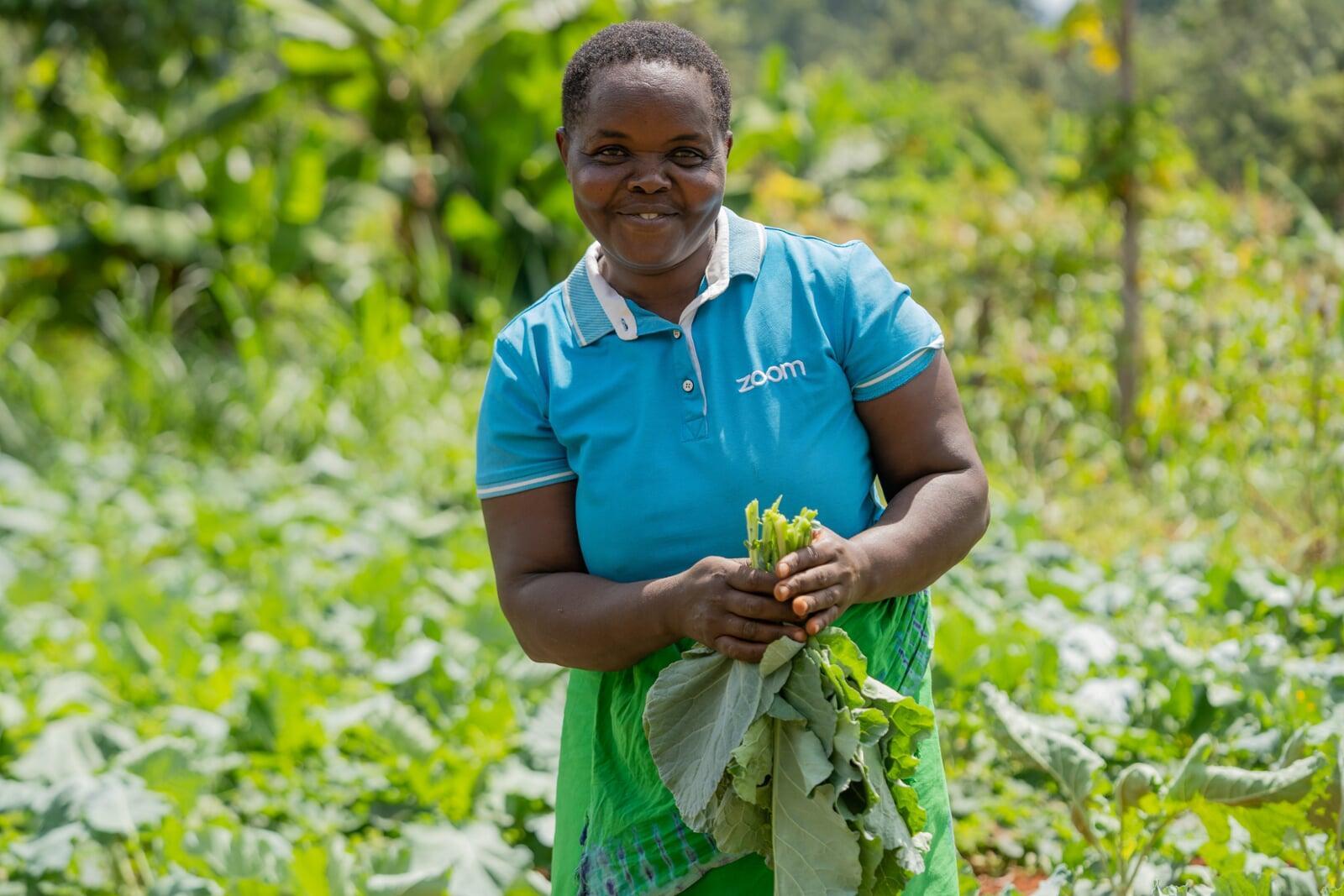
In the lush fields of Mbeti North Ward, Manyatta Subcounty, Phylis Ruhuru is growing more than just vegetables she’s cultivating hope, income, and resilience through regenerative agriculture (RA). As a Village-Based Advisor (VBA), Phylis is not only producing healthy horticultural crops but also empowering farmers to do the same.
Before embracing RA, farming was unpredictable. But after receiving training through the AGRA-supported STRAK project, implemented by CGA, Phylis transformed her approach. She now uses organic compost, mulching, and proper spacing to grow kale, spinach, and other vegetables. She fetches water from a hand-dug well, ensuring her crops stay green even during dry spells.
“The demand for vegetables is always high,” says Phylis. “With RA, I meet that demand, feed my family, and keep my customers smiling.” Phylis sells her produce to local markets, turning her farm into a steady source of food security and financial means. As a VBA, she’s introduced dozens of farmers to RA-based horticulture, helping them unlock year-round income from small plots.
“RA helped me see that a small farm can be powerful. We grow better, earn more, and depend less on chemicals,” she explains. she explains. Her journey highlights the value of adopting simple, sustainable practices. From soil health to customer happiness, Phylis’ model is proof that regenerative farming pays both in the pocket and in the community.
Growing Trees, Growing Futures in Embu County
Simon Mwangangi

In Rianjeru, Mbeti South Ward, a quiet green revolution is being led by a young visionary Simon Mwangangi, founder and CEO of VUMA Enterprise and a former employee in the ICT sector. At just 28, Simon is not only running a thriving agroforestry nursery, but also empowering youth and building a business rooted in regenerative agriculture (RA).
Simon was introduced to RA through capacity building by Farm Africa, and it changed everything. “We used to think farming was for survival,” he says. “Now, we see it as a business, a solution, and a future.”
Today, VUMA Enterprise employs seven young people, producing high-quality agroforestry seedlings that are in high demand across the region. With a recent order of 800,000 seedlings, Simon’s enterprise is proving that RA is scalable, profitable, and youth-friendly.
Technology, he says, has been a game-changer. “With AI and digital tools, we research, learn faster, and improve our methods.” From nursery management to client engagement, tech is tightly woven into the fabric of his enterprise.
“What makes me proudest,” Simon shares, “is seeing young people working, learning, and building something meaningful.” Backed by the skills he gained in IT; Simon has built more than a business he’s built a movement of youth-led, climate-smart agriculture. He’s open to partnerships and believes the future of RA lies in collaboration, technology, and youth-driven energy.
“RA is the future. It’s clean, profitable, and impactful. We’re not just planting trees we’re planting hope.”
Simon Mwangangi, CEO, VUMA Enterprise
Through Simon’s story, it’s clear: when young minds meet regenerative methods, transformation takes root.
From Doubt to Abundance
Diana Wambui’s Regenerative Turnaround in Mbeere South
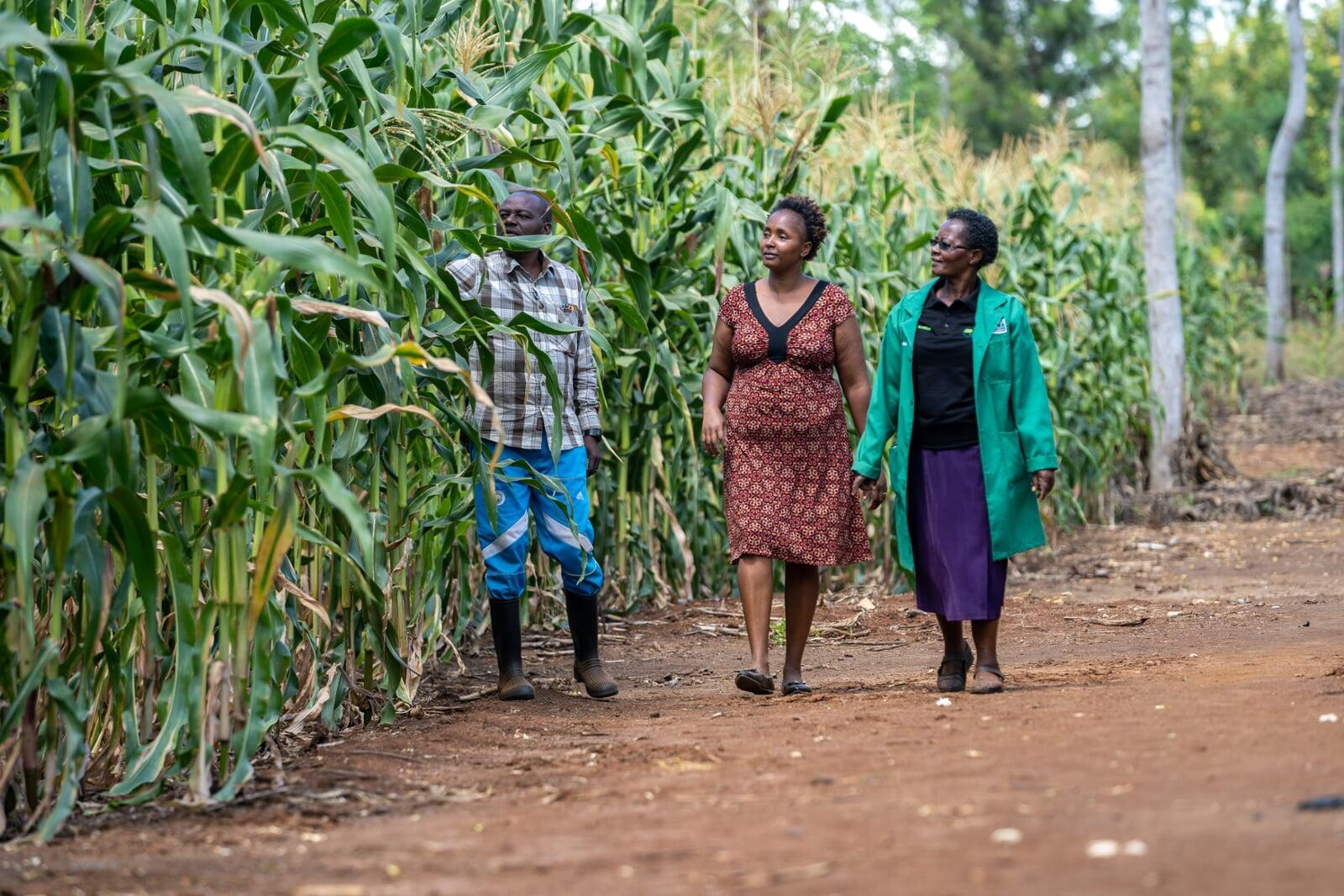
In Gackoka Village, Mbeti South Ward, Diana Wambui once looked at her farm with frustration. Despite hard work, the yields were low, the land felt tired, and her motivation was fading. “I was tilling empty land. It was farming at a loss,” she recalls.
Everything changed when Diana met Agnes Kariuki, her local Village-Based Advisor (VBA) under the AGRA-supported STRAK project, implemented by Farm Africa. Agnes introduced her to Regenerative Agriculture (RA) and at first, Diana didn’t believe it could work. But one visit to Agnes’ demonstration plots opened her eyes.
Step by step, Diana began adopting RA practices: minimum tillage, mulching, manure use, and crop residue recycling. “I now cut maize stalks and return them to the soil. It holds moisture and feeds the soil life,” she explains. These practices have turned her once-exhausted land into a thriving space growing pawpaw, maize, and more.
Her confidence has grown with her crops. Diana now dreams of food security for her household and her community, and she’s eager to pass the knowledge forward. “RA is real. If you’re still farming traditionally, it’s time to change.”
The biggest challenge? “Some practices need money, and that can slow things,” she says honestly. But her gratitude is clear: “I thank VBA Agnes deeply she helped me believe and begin.”
“RA revived my land and my morale. I’m now farming with purpose, and I’m proud of my farm.”
— Diana Wambui, Farmer, Mbeere South Subcounty
The Woman Turning Farms into Classrooms in Mbeere South
Agnes Kariuki
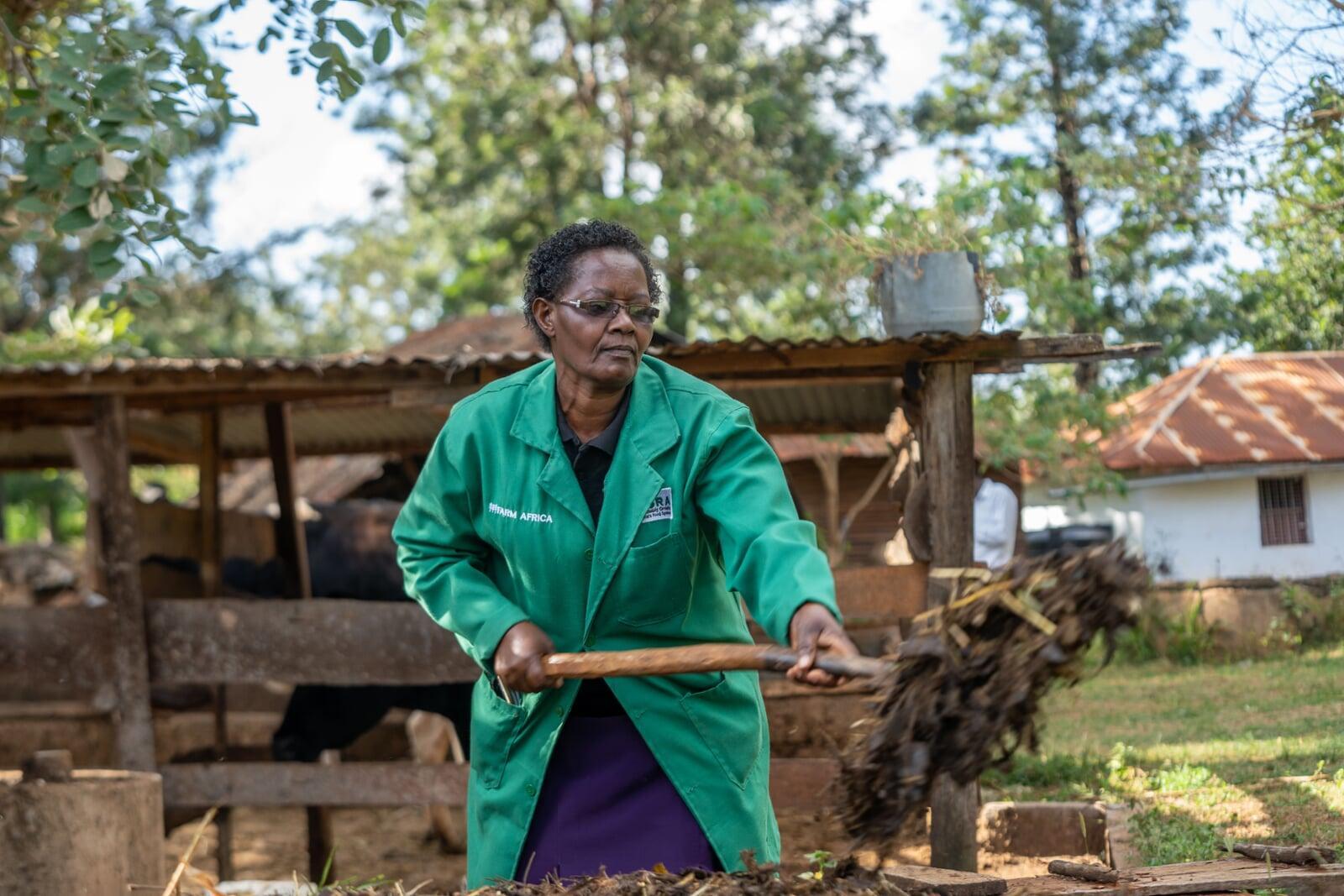
In the hills of Mbeere South Subcounty, Agnes Kariuki wakes up every day with a mission: to grow food, grow knowledge, and grow the future. As a Village-Based Advisor (VBA), Agnes has become a powerhouse of Regenerative Agriculture (RA) demonstrating what’s possible when one woman decides to lead by example.
When Farm Africa introduced her to the AGRA-funded STRAK project in 2022, Agnes didn’t just adopt RA practices she embraced a new way of life. Her farm now functions as a live classroom, showcasing everything from agroforestry and fruit farming, to biogas, livestock-crop integration, kitchen gardening, and soil and water conservation. Her trial demo plots don’t just teach techniques they change mindsets.
“The journey begins by showing farmers the reality,” she explains. “Then we walk it together.” Agnes' typical day is a masterclass in strategic farming and community building. She trains farmers, coordinates group input supply, aggregates produce, and connects them with partners chick suppliers, fodder sources, and seed companies. But her true strength lies in how she plans and prepares not just for her own farm, but for the success of every farmer she supports. Her greatest motivation? Seeing farmers grow clean food, earn sustainable income, and believe in the soil again.
“My farm is more than my livelihood it’s a training ground. Regenerative Agriculture is not just a practice. It’s a path to dignity, productivity, and profit.”
Agnes Kariuki, VBA & Change Leader, Mbeere South
Agnes is not just part of the STRAK story she is one of its greatest chapters.she is one of its greatest chapters.
Farming the Future with Regenerative Practices in Kirimari Ward
Charles Mwaniki

In Kirimari Ward, Manyatta Subcounty, Charles Mwaniki is showing what happens when traditional farming meets modern, regenerative wisdom. As a Village-Based Advisor (VBA), Charles is helping rewrite the farming narrative where resilience leads to profitability and purpose.
His journey began when Farm Africa introduced him to the AGRA-supported STRAK project. That moment sparked a transformation not just of his farm, but of his mindset. “Before STRAK, I was farming without direction. Now, I farm with a future in mind,” Charles shares.
Today, his farm is a model of Regenerative Agriculture (RA): from composting and cassava intercrop to fodder production, banana plantations, and fruit trees like avocado and macadamia. He also practices livestock–crop integration, building a circular economy where nothing goes to waste. “The farm feeds itself now. The manure from livestock boosts my cassava and bananas. It’s all connected,” he explains.
Charles uses his own success to inspire others. As a VBA, he trains farmers on composting, RA planting techniques, and long-term soil fertility. His farm doesn’t just feed his household it generates income, protects the land, and sets an example for the next generation.
“Regenerative Agriculture gave me clarity. Now I see farming as a business with real hope for the future,” he says. From rich soils to richer dreams, Charles Mwaniki is proving that with the right support, farming can rise again stronger, smarter, and sustainable.
From Bare Fields to Full Sacks
Shadrack Mutie’s Sorghum Breakthrough in Makueni
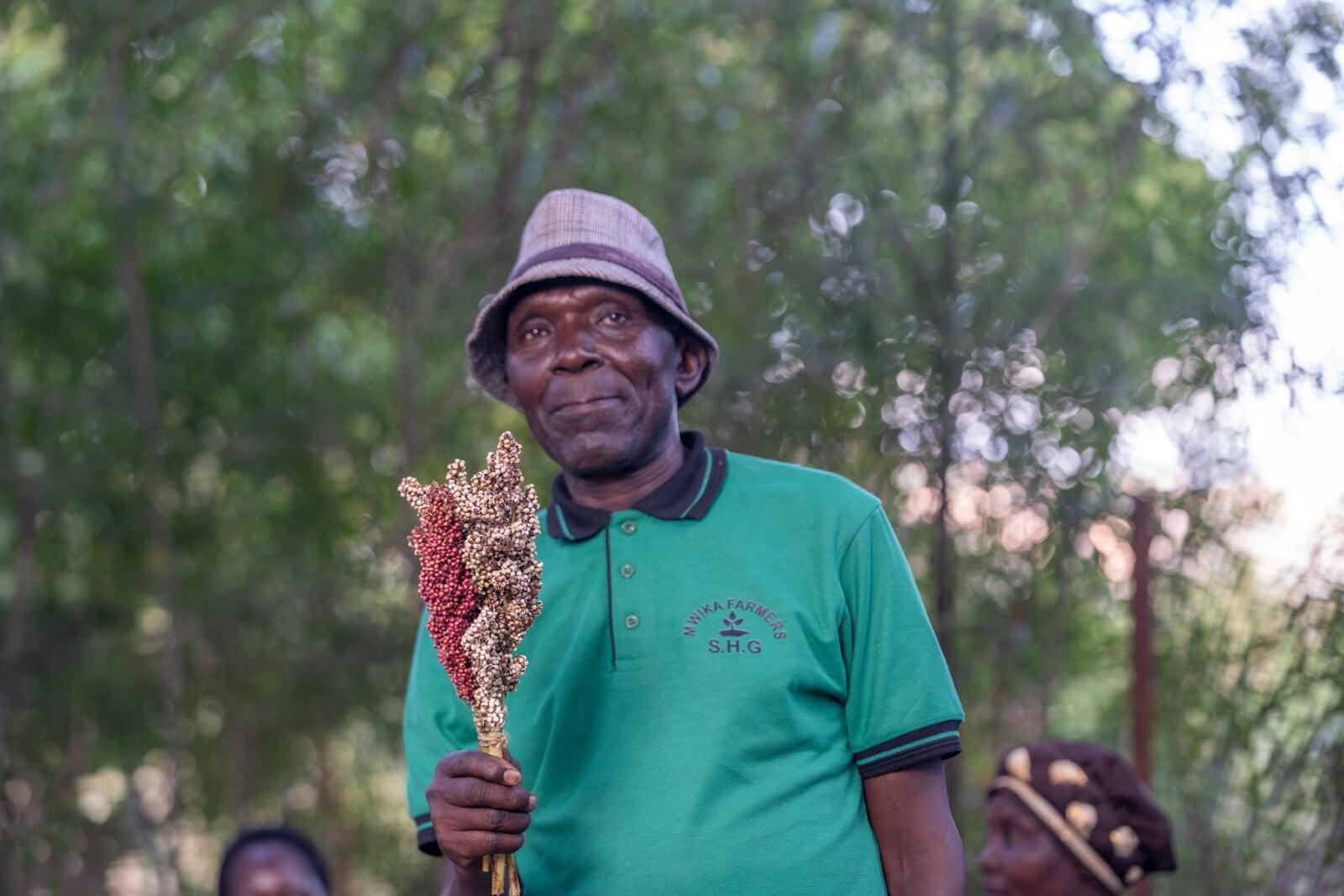
In Mwaani Village, Makueni County, Shadrack Mutie once struggled to grow enough food for his household. Sorghum yields were poor, the soil was tired, and each season ended with more worry than harvest. “I used to plant, but get nothing meaningful. It was frustrating,” he recalls.
Everything changed when Shadrack joined the Mwika Self-Help Group, supported by VBA Christine Ndambuki through the STRAK project, implemented by CGA with support from AGRA. Christine introduced him to Regenerative Agriculture (RA) techniques specifically Zai pits, agroforestry, and soil management practices.
He gave it a try. The results were immediate and game-changing. “I now get four full sacks of sorghum from just one acre. Before, it wasn’t even one,” Shadrack says, with a proud smile.
His land, once dry and underperforming, is now vibrant and productive. The Zai pits help retain moisture. Trees planted through agroforestry help restore soil structure. And with RA practices in place, food security is no longer a worry for his family. food security is no longer a worry for his family. “Now, my farm is doing great. We eat from it, and we even sell. I’m not farming in fear anymore,” he shares. This turnaround didn’t happen overnight but with guidance, practical tools, and the right mindset, Shadrack has moved from survival to surplus.
“STRAK changed how I farm. RA brought back life to my land and hope to my home.”
— Shadrack Mutie, Sorghum Farmer, Makueni County
Shadrack’s story is proof that even in drylands, with the right support, farming can thrive again—one Zai pit at a time.
From One Vine to a Farm Full of Promise in Makueni
Zipporah Kaleli
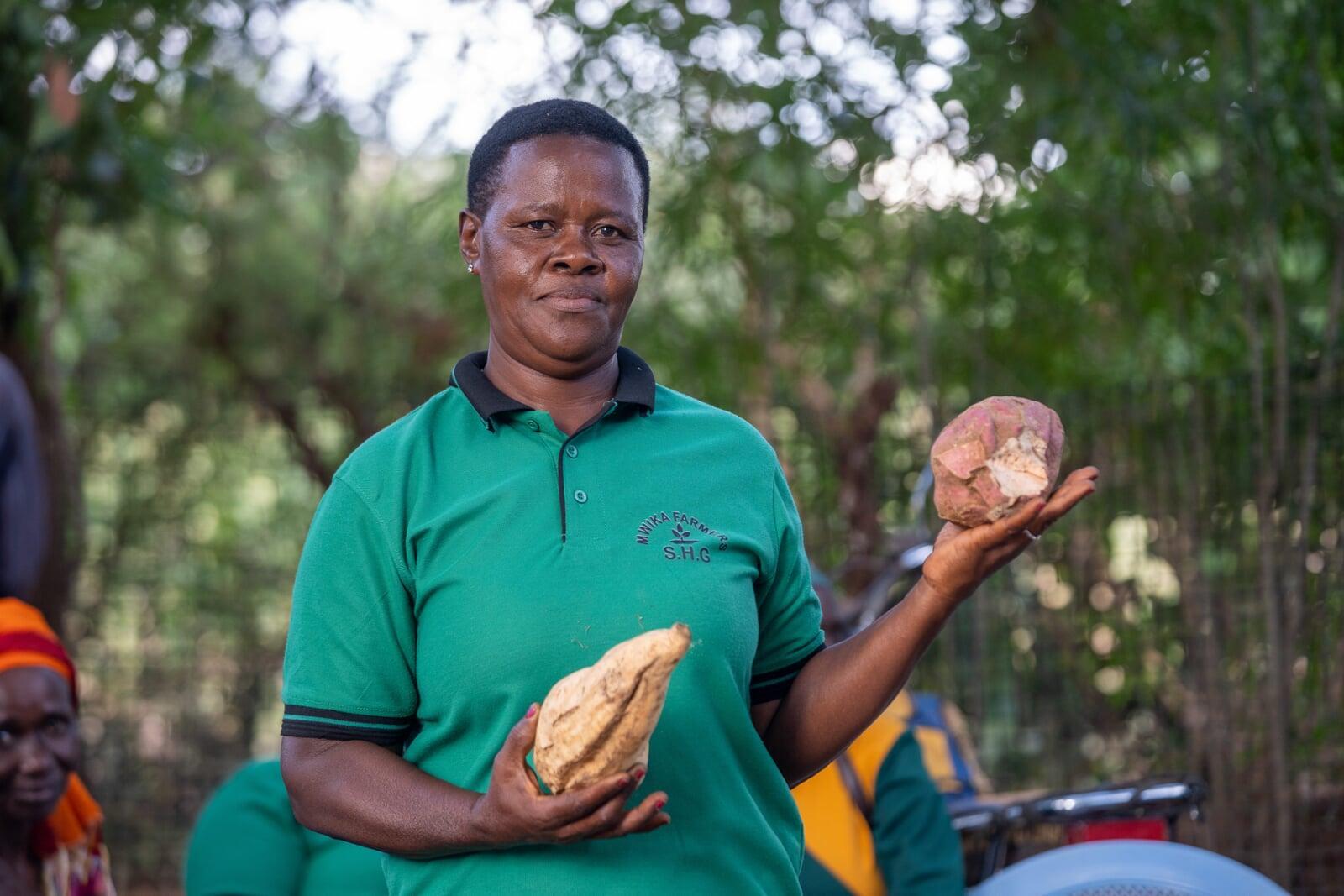
In Makueni County, Zipporah Kaleli has found her stride in farming, thanks to the introduction of Orange-Fleshed Sweet Potatoes (OFSP) and regenerative farming practices taught by her trusted VBA, Christine Ndambuki, under the STRAK project.
“Before STRAK, my farm was not doing well. I planted, but nothing much came from it,” Zipporah shares. That changed when Christine introduced her to RA practices and gave her access to OFSP vines a game-changer crop that begins yielding within just 90 days.
What started as a trial turned into a breakthrough. Zipporah now harvests so many sweet potatoes that she can fill an entire pickup truck. The crop feeds her family, earns her income, and has inspired others in her village to ask, “What’s your secret?”
But sweet potatoes aren’t her only win. Zipporah has embraced diversification adding papayas, pumpkins, honey, and agroforestry trees like Leucaena to her farm. These choices build resilience against climate shocks, while improving soil health and household nutrition.
Her biggest challenge remains pest attacks, but she’s confident in her support system. “Christine has helped me this far. I know she’ll show me how to handle this too,” she says with trust.
“My farm used to struggle. Now it feeds, it sells, and it shines. RA gave me back my confidence.”
— Zipporah Kaleli, OFSP Farmer, Makueni County
Zipporah’s story is a sweet reminder that with the right crop, the right training, and the right mindset, farming can bloom again.
